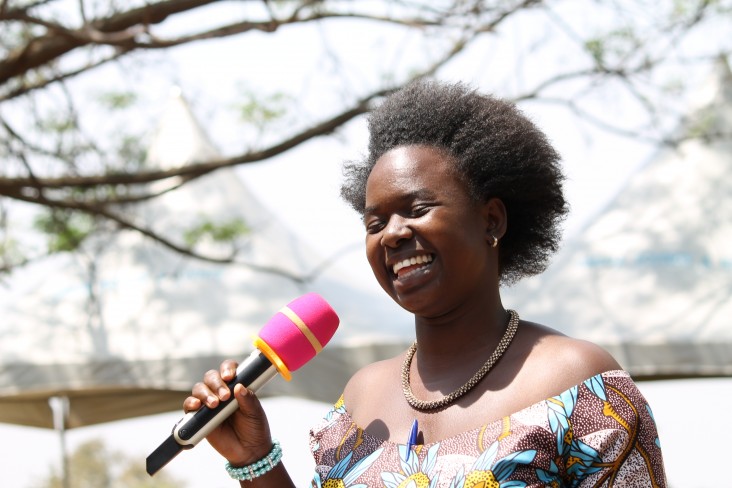Speeches Shim

The roads that crisscross northern Uganda’s Lamwo district connect a network of villages set against a vast expanse of land and sky. Far from the hustle of the nearest cities, the air is still and quiet enough that conversations can be interrupted by the sounds of passing lizards and thoughts distracted by the birds soaring overhead. Uganda’s abundant natural resources, fertile soil, stable government, and steady economic growth present distinct opportunities for its population. Despite this, large swathes of the population remain vulnerable, particularly here in the north. This is one of the poorest regions of the country, still recovering from decades of turmoil and civil war. The school dropout rate is high, as are instances of early marriage, teenage pregnancy, and alcoholism.
The USAID Integrated Community Agriculture and Nutrition activity is USAID’s flagship resilience project in Uganda. Over five years, the activity will work through existing community groups to increase economic opportunities for vulnerable households, promote a nutritious diet, and improve relationships between local government and the communities they serve.
In Lamwo, USAID partnered with the Children of the World Foundation, a Ugandan NGO based in nearby Kitgum town, to provide out-of-school adolescent girls and young women with a series of intensive training camps and innovative mentorship programs. Community members in five villages identified a total of five hundred young women who could benefit from the camps. Local leaders then found women from the community who could serve as mentors. As Regional Team Lead Bonny Oola explains, “The mentors were selected based on specific criteria: that they already had skills, that they were familiar with the conditions to which the girls were exposed, and that they possessed skills for training.”
Mentors included businesswomen, doctors, and teachers, among others. They were women who had themselves been raised in these villages, facing the same hardships as the girls they would now mentor, and who had overcome the obstacles before them to succeed in life. The girls were divided among them in groups of twenty-five, and activities at the camp were designed to maximize interaction between mentors and mentees.
“These are young girls, age fifteen to twenty-four, dropouts from school,” Bonny says. “Others got pregnant, have children, they are just staying on their own, with parents, and they basically have nothing to do. We ran three camps. Each camp was run through the holidays. Basically the intention of the camp...is to show them their own assets, skills, self-confidence, and empower them to build healthy lives and more resilience in all aspects of life.”
“When the girls first came, they wouldn’t talk,” says Sandra Ayumi, a midwife at Palabek Kal Health Center who served as a mentor. “At first, it was challenging. They had ‘different different’ personalities,” she explains, using a Ugandan euphemism that hints at the challenges the mentors faced. “But when they came we taught them about self-respect, and then respect for one another.”
Bonny Oola describes the overall program. “The first camp was basically to have their voices, we’re talking building their capacity to have their voice. And the second camp is about the choice, how they make the choice in life, and exposing them to different skills. The third one now is control: you’ve made a choice, how you move forward. But most importantly, the skills to give them a source of livelihood, to make money, be socially fit in the community, but also the skills of negotiation in life. Voice, choice, control: that was what we were trying to teach them.”
“Yes, we give skills, we give hardware,” asys Patience Akumu, the activity’s communications specialist. “But most of all we just want to inspire the girls and tell them, ‘It’s possible.’ And the girls take it from there, they use their own agency, they make the decision.”
On January 24, 2020, at a boisterous ceremony in the village center, the mentors joined their mentees to celebrate graduation. Already many of the young women have formed businesses or returned to school. The mentors themselves were also celebrated for their hard work and commitment to changing these women’s lives. As Sandra admits, “It changed me, too.” She laughs about how much of her salary went to purchasing new shoes. Teaching the girls about the importance of financial management caused her to rethink her own habits. “Before I would not save, but now I understand that it is important to have a savings culture.”
At the ceremony, Sandra spoke eloquently and at length about her young charges. Afterwards she was asked where she learned to be such an effective public speaker. She confessed that she had never spoken publicly before joining this program, and then smiled, realizing that she had joined them on their journey even more than she knew.

Comment
Make a general inquiry or suggest an improvement.